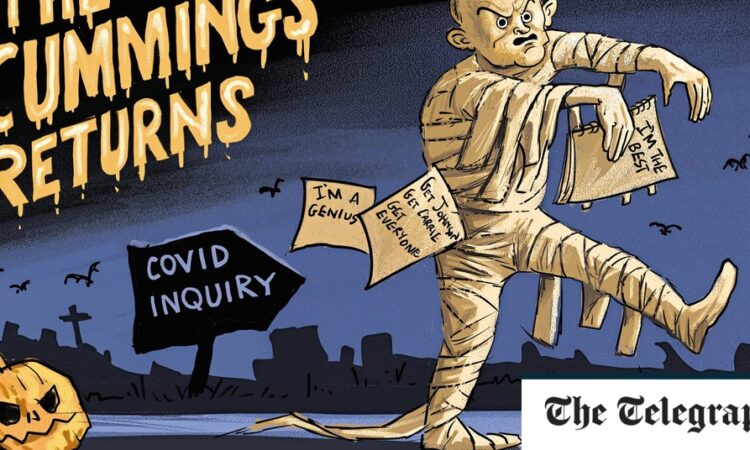
There’s a critical element of the Covid Inquiry that you don’t see on TV: the audience. The press gets just four seats, the public around 30; and some of them sit – for hours – holding photos of dead relatives, hoping that Boris or Hancock will look at that picture and realise what you did.
Is this appropriate? It’s hardly conducive to a cool assessment of the facts. The deceased are cast from the off as victims, not of a disease but of a government that was inept or even pro-death. A quote from Boris was read out last week: the median age of Covid fatalities for men was 82, for women 85 – above life expectancy. So, he joked, does this mean ”get Covid and live longer”? There were cries of horror.
Yet some of the subjects in the photographs at the Inquiry are quite elderly. Every death is a sadness; every extra year is precious. But death is a certainty, and it’s inevitable that there’ll be more of it in a pandemic.
Human beings would love to live forever and earn money without leaving bed, two fantasies that were indulged by lockdown.
Every era finds new language to market the impossible. You may have heard that Sam Bankman-Fried, the entrepreneur who promised to make people rich ethically (another utopian dream), has been convicted of a crime most of us will never understand.
What is a cryptocurrency exchange? No idea. But a friend says, “when economics is too complex to explain, it’s a fraud” – and once you see Fried’s business as a Ponzi scheme (I take your money, then take someone else’s to pay you back) one wonders why so many clever people bought into it.
Why did old rich men think Elizabeth Holmes, a blond neophyte with a come-to-bed voice, could invent a machine that would do all their blood work with a single prick? Why did our super smart PM gush over Elon Musk, a capitalist genius who has received billions in government funding – and is seemingly driving his proudest acquisition, X, into the ground?
AI, Musk told Rishi at their romantic summit, will eliminate work and guarantee us all high incomes.
It won’t. Anyone who has thought for more than five seconds about the subject will tell you that. His general theory that tech can rewire our society is flaky, too; AI made by human beings operates like a human being, which is why it has been observed to turn racist or encourage suicide. Just as there is no cure for death, there is no tech fix for human nature – a conclusion that, if you pay attention, the Covid Inquiry demonstrates. Alas, there is no listening in the hearings room.
In his compelling testimony, Dominic Cummings described the challenge of running broken Britain: a Victorian constitution with a Soviet bureaucracy operating out of a Downing Street better designed for state dinners. All true. But what was his solution? Government by data – interpreted from a No 10 mission control. The man who told us to vote Brexit to regain democracy wanted to centralise power in his laptop.
The word “data” suggests facts and logic, yet its consequence was hysteria. It was the data that in early 2020 suggested we were on the verge of mass death and NHS collapse – the modelling (plus scares from China and Lombardy) that pushed us into lockdown. Sage said 90,000 beds with ventilators might be needed; use peaked at 2,849. One might counter that such predictions did not pass precisely because we acted as we did – but the Inquiry has heard that the disease was already in the UK (a failure of border control, says Cummings). There’s evidence that the first Covid wave infections peaked before we entered lockdown.
In short, if you favour a data-driven government that captures the executive, cuts out legislative influence, and can make stuff happen at the push of a button (whoosh! Up goes a Nightingale hospital!) then, you got your wish from 2020-21.
Unfortunately, as fresh data comes in, it looks like one of the biggest blunders in history, destroying our health, wealth and education.
Who doubted lockdown at the time? Lunatics who oppose everything, always; qualified professionals who said “diseases and populations don’t work this way”; and ignorant peasants, like me, for whom the rules were an affront to common sense. Why could we only have fresh air once a day? We could see the masks don’t work. We knew that zero contact with others would only make us susceptible to non-Covid diseases. Wasn’t it better to shield the elderly and vulnerable?
But few of us spoke out because “the data” did sound scary, and emotional weight lay heavily on saving the people we loved against all odds (we’re back to those photos, held so tightly, as if they were the real thing). Had the clergy talked to us about the facts of death and the promise of Heaven, we might have found some stoicism. But with the churches shut, we worshipped dancing nurses instead.
It’s tempting to see the modern world as a battle between intellectualism, which claims to be sublimely rational yet is faddish, sentimental and wrong, vs common sense, which endures the madness of elite endeavour, as woven into folk consciousness as nursery rhymes and sensible superstition (it really is unwise to walk under a ladder). I am not saying one should never trust an expert again. But when the next crisis comes along, and the response looks iffy, I’m going to trust my own instincts more.






